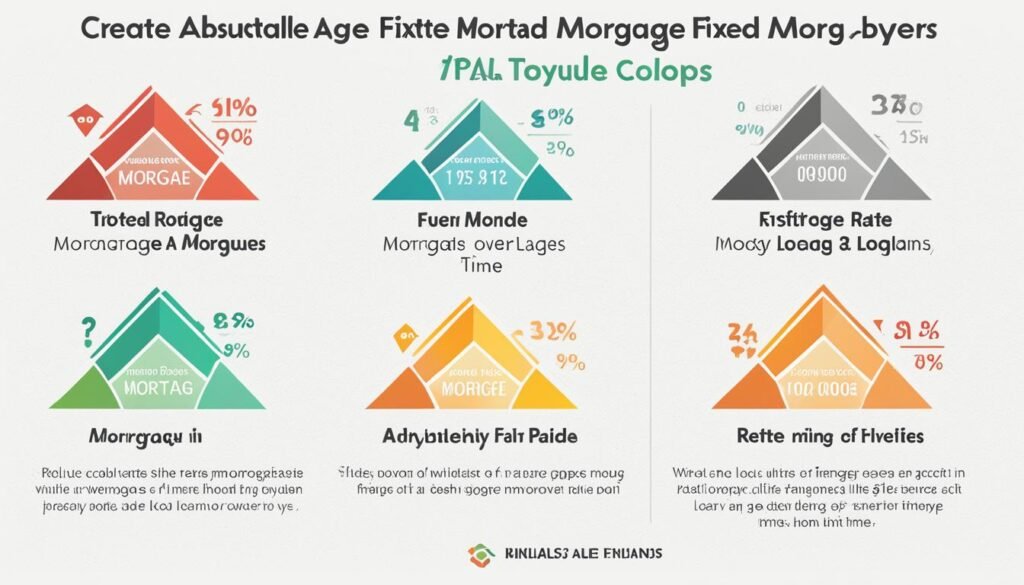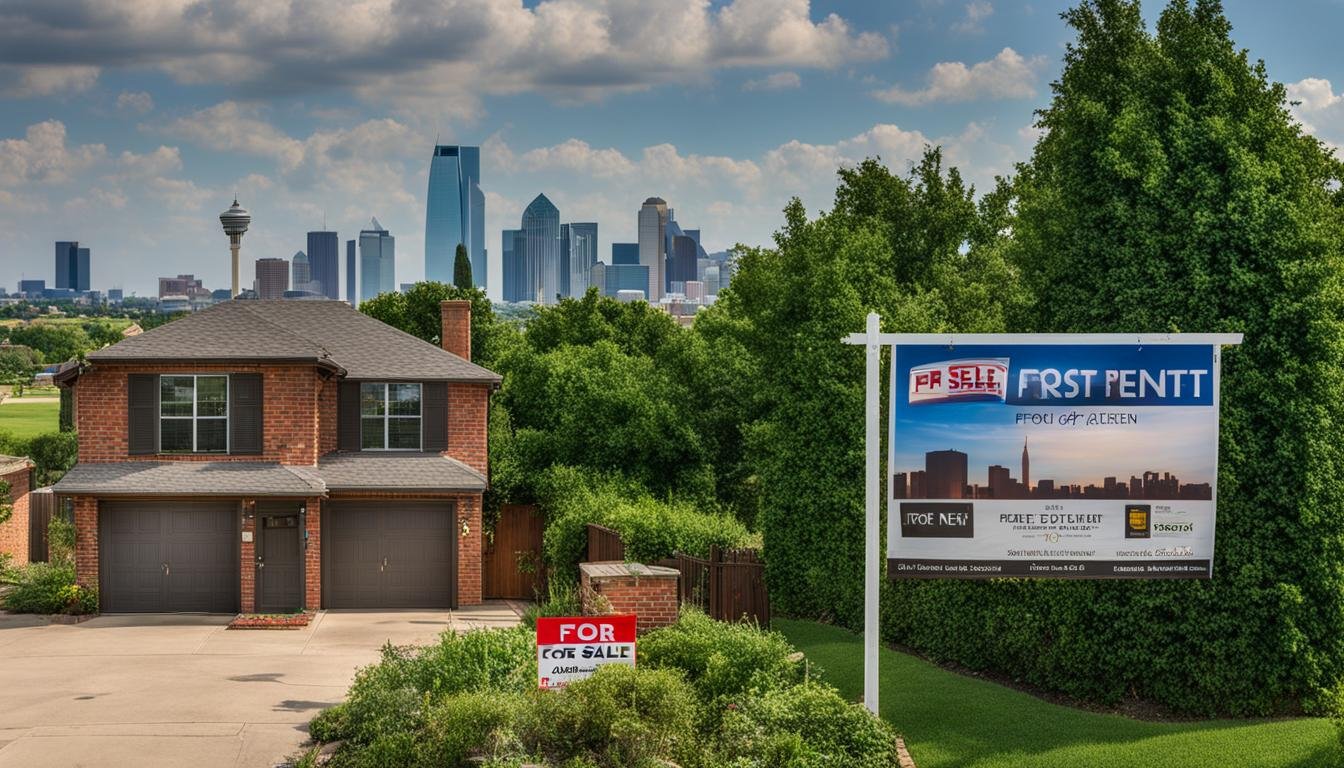When it comes to finding a place to call home in Dallas, you may be faced with the decision of whether to buy or rent. This choice can have significant financial and lifestyle implications, so it’s important to weigh the pros and cons of each option.
Buying a home in Dallas means investing in real estate and gaining the benefits of property ownership. With a mortgage, you can build equity over time and potentially take advantage of tax deductions. On the other hand, renting offers flexibility and requires less commitment, allowing you to easily move if needed.
To determine the best option for you, it’s crucial to consider your long-term plans, financial situation, and personal preferences. Let’s explore the factors that can help you make an informed choice between buying and renting in Dallas.
Key Takeaways:
- Buying a home in Dallas offers the benefits of property ownership and potential tax deductions.
- Renting provides flexibility and requires less commitment.
- Consider your long-term plans, financial situation, and personal preferences when deciding between buying and renting.
- Weigh the pros and cons of each option to make an informed choice that aligns with your lifestyle and goals.
- Consult with a real estate professional to get personalized advice based on your specific circumstances.
Cost of Renting vs. Cost of Buying
When it comes to the cost of renting versus buying a home in Dallas, there are several financial factors to consider.
Renting: Renting a home involves paying monthly rent, which can vary depending on the size, location, and condition of the property. Additionally, renters are responsible for obtaining renter’s insurance to protect their belongings and liability. Over time, renters may also face potential rent increases, which can impact their monthly expenses.
Buying: On the other hand, buying a home comes with upfront expenses. These include a down payment, which is a percentage of the home’s purchase price, as well as mortgage fees and closing costs. It’s important to note that the down payment requirement can vary depending on the type of mortgage and the lender’s criteria. Ongoing expenses for homeownership include mortgage payments, which consist of principal and interest, as well as mortgage insurance, property taxes, homeowner’s insurance, and maintenance costs.
By considering the cost of renting and buying, you can determine which option is more affordable for you in Dallas. Keep in mind that the specific costs will vary depending on the property, location, and individual circumstances.
To illustrate the difference, here’s a comparison:
| Expense | Cost of Renting | Cost of Buying |
|---|---|---|
| Monthly Payment | Rent | Mortgage Payment |
| Insurance | Renter’s Insurance | Homeowner’s Insurance |
| Upfront Expenses | N/A | Down Payment, Mortgage Fees, Closing Costs |
| Ongoing Expenses | Potential Rent Increases | Mortgage Payments, Property Taxes, Maintenance Costs |
Note: The table above provides a general comparison of the typical expenses involved in renting versus buying a home. Actual costs may vary depending on the specific property, location, and individual circumstances.
Understanding the cost implications can help you make an informed decision that aligns with your financial situation and housing goals.
When to Rent vs. Buy
The decision to rent or buy a home involves considering various factors, such as short-term vs. long-term plans, financial logic, and the breakeven year. Choosing between renting and buying depends on your specific circumstances, housing goals, and preparedness for homeownership.
If you have short-term plans or value flexibility, renting may be the better choice. Renting allows you to avoid the responsibilities of homeownership and easily relocate when needed. It suits those who prioritize mobility or uncertainty in their future plans.
On the other hand, buying a home offers advantages in the long run. It allows for property ownership, potential tax benefits, and the opportunity to build equity. Homeownership provides stability and a sense of belonging as you have control over your living space. It can be a smart financial decision if you plan to stay in the area for an extended period.
The breakeven year, the point where the long-term costs of renting outweigh the upfront costs of buying, varies based on location and individual circumstances. It’s crucial to evaluate the local real estate market, consider projected rent increases, and assess your ability to handle homeownership expenses.
Ultimately, the rent vs. buy decision should align with your financial goals, lifestyle, and long-term plans. While renting provides flexibility, buying allows you to invest in property and potentially benefit from appreciation over time.
Consider the following factors when deciding whether to rent or buy:
- Your short-term and long-term housing plans
- Your desired level of flexibility
- Your financial readiness for homeownership
- The breakeven year in your area
By carefully evaluating these factors, you can make an informed decision that suits your current and future housing needs.
Rent or Buy Comparison
Renting and buying a home both have their own advantages and considerations. Understanding the pros and cons of each option can help you make an informed decision that aligns with your situation and goals in Dallas.
Advantages of Renting
- Flexibility: Renting provides the flexibility to easily move within or outside of Dallas without the commitment of a long-term mortgage.
- Less Maintenance Responsibility: As a renter, you’re typically not responsible for major maintenance or repair costs, which can save you both time and money.
Advantages of Buying
- Stability: Buying a home offers long-term stability, allowing you to establish roots in a community and create a sense of belonging.
- Equity Building: Homeownership provides the opportunity to build equity over time as you pay down your mortgage, potentially leading to increased wealth.
- Potential Tax Deductions: Homeowners may be eligible for tax deductions, such as mortgage interest deduction, which can lower their overall tax liability.
However, it’s important to consider the financial responsibilities that come with homeownership. Property taxes and homeowner’s insurance are additional costs to consider when buying a home.
“Owning a home allows for stability, equity building, and the potential for tax deductions, while renting offers flexibility and less maintenance responsibility. Consider your long-term goals and financial situation to determine the best option for you.”
“Renting and buying have their own advantages. Renting offers flexibility in terms of moving and less responsibility for maintenance. However, renters do not enjoy the wealth-building benefits of homeownership and may face rent increases over time.”
Comparing the advantages of renting and buying can help you evaluate which option is more aligned with your priorities and lifestyle in Dallas.
To provide a comprehensive overview, here’s a table comparing the advantages of renting and buying:
| Advantages of Renting | Advantages of Buying |
|---|---|
| Flexibility | Stability |
| Less maintenance responsibility | Equity building |
| Potential tax deductions |
Keep in mind that the decision between renting and buying depends on various factors, including your financial situation, long-term goals, and personal preferences. It’s essential to weigh the advantages and considerations of each option before making a housing decision in Dallas.

The Background Behind the Shift from Homeownership to Renting
The decision between homeownership and renting has undergone a significant shift in recent years, largely influenced by the housing bubble and subsequent financial crisis that occurred in 2007. The bursting of the housing bubble led to a sharp decline in home values and a wave of foreclosures, shaking the confidence in homeownership as a safe and secure investment.
With the housing market in turmoil, many individuals and families turned to renting as a more viable option. Renting provided flexibility and freedom from the risks and financial burdens associated with owning a home during a time of economic uncertainty.
In today’s real estate landscape, the decision to rent or buy a home is no longer a simple matter of financial consideration. Various factors, such as income stability, housing market conditions, and personal preferences, all play a role in determining the best housing option for individuals and families.
“The housing bubble and subsequent financial crisis in 2007 had a significant impact on the perception of homeownership as a safe investment.”
The aftermath of the housing bubble and financial crisis highlighted the importance of conducting thorough evaluations of the costs and benefits associated with homeownership. Renting offers certain advantages, including lower upfront costs and the ability to easily relocate. On the other hand, homeownership provides individuals with the opportunity to build equity, enjoy potential tax benefits, and establish a sense of stability and pride in their own property.
Impact on the Housing Market
The housing bubble and subsequent financial crisis had a profound impact on the overall housing market. The burst of the bubble caused housing prices to plummet, leaving many homeowners with properties that were worth significantly less than what they had paid for them.
Foreclosures were rampant, causing a surge in the number of properties available for sale. This influx of supply led to a decrease in demand, further exacerbating the decline in home prices. As a result, many aspiring homeowners found themselves unable or unwilling to take on the financial risks associated with purchasing a property.
The Rise of Renting as an Alternative
During the financial crisis, renting emerged as an appealing alternative to homeownership for many individuals and families. Renting provided a level of flexibility and freedom from the financial burdens of homeownership during a time of economic uncertainty.
Moreover, the perception of homeownership as a safe and secure investment was challenged, prompting people to question whether renting might be a more financially responsible choice. The financial crisis served as a wake-up call, emphasizing the importance of careful financial planning and realistic assessments of affordability.
In the years following the financial crisis, the dynamics between homeownership and renting continue to evolve. The decision between the two options is no longer a one-size-fits-all answer but rather a complex calculation that takes into account individual circumstances, financial considerations, and personal preferences.
How Long You Have to Live in America’s Biggest Cities for Buying to Make Sense
The decision to buy or rent a home in major cities across the United States is influenced by several factors, including the homeownership premium, the breakeven point, and the comparison of renting vs. buying costs. Understanding these dynamics can help you make an informed housing decision that aligns with your financial goals.
In cities like New York, San Francisco, and Los Angeles, the homeownership premium is significantly higher compared to renting. This premium reflects the additional costs associated with buying a home, such as mortgage payments, property taxes, and maintenance expenses. It may take over a decade to reach the breakeven point, the point at which the long-term costs of owning a home become more favorable than renting.
“The breakeven point is the time it takes for homeowners to recover the upfront costs of buying.”
In contrast, cities like Detroit, Philadelphia, and Houston offer a different scenario. These cities have lower housing costs and stagnated home values, making buying a home a more cost-effective option in the long run. The breakeven point in these cities is shorter, meaning homeowners can recover their upfront costs sooner.
When considering the duration required to make buying a home financially logical, it’s essential to evaluate your long-term plans and factors unique to each city. Factors such as housing market competitiveness, mortgage rates, and upfront costs contribute to the breakeven point and overall affordability of buying vs. renting.
Table: Breakeven Point in Major U.S. Cities
| City | Breakeven Point (in years) |
|---|---|
| New York | 12+ |
| San Francisco | 10+ |
| Los Angeles | 11+ |
| Detroit | 7- |
| Philadelphia | 8- |
| Houston | 8- |
It’s important to consider these differences when deciding whether buying or renting is the better option for you in major cities. Evaluating the breakeven point and weighing the financial implications can provide valuable insights into the affordability of homeownership and help inform your housing decision.

Buying is more affordable than renting in certain cities
While buying a home may be more expensive than renting on a national level, there are specific cities where buying is more affordable. In cities like Detroit, Philadelphia, Cleveland, and Houston, the homeownership premium is lower, meaning the costs of owning a home compared to renting are more favorable. Factors such as stagnant home values and lower mortgage rates contribute to the affordability of buying in these cities. It’s important to consider local market dynamics and mortgage rates when determining whether buying or renting is the better option.
When looking for affordable cities for buying, consider locations like:
- Detroit
- Philadelphia
- Cleveland
- Houston
In these cities, the homeownership premium is lower, making it a more affordable option compared to renting. Stagnant home values and lower mortgage rates contribute to the cost-effectiveness of buying in these areas.
For example, in Detroit, the median home price is significantly lower than the national average, making it more affordable for buyers. Additionally, mortgage rates are currently low, further enhancing the affordability of homeownership in the city.

Homeownership Premium Comparison: Renting vs. Buying
| City | Homeownership Premium |
|---|---|
| Detroit | 10% |
| Philadelphia | 8% |
| Cleveland | 9% |
| Houston | 11% |
As shown in the table above, these cities have a lower homeownership premium compared to the national average, which means the costs of owning a home are more affordable in comparison to renting.
When considering the rent vs. buy decision, it’s crucial to take into account the local market dynamics and mortgage rates. By analyzing these factors, you can determine whether buying or renting is a better financial choice in these specific cities.
Adjustable-rate vs. Fixed-rate Mortgages
When considering homeownership, it’s important to understand the types of mortgages available. An adjustable-rate mortgage (ARM) has an interest rate that can change over time, potentially affecting monthly payments. A fixed-rate mortgage, on the other hand, has an interest rate that remains constant for the entire loan term, providing stability in monthly payments. Factors such as the loan amount and the length of time you plan to stay in your home should be considered when deciding between an adjustable-rate or fixed-rate mortgage.
Let’s take a closer look at the differences between these two mortgage options:
Adjustable-rate Mortgage (ARM)
An adjustable-rate mortgage starts with an initial fixed interest rate for a specific period, usually ranging from 3 to 10 years. After the initial period, the interest rate adjusts based on market conditions and predetermined factors. The interest rate changes periodically, typically once a year. The adjustment may result in lower or higher monthly payments, depending on the interest rate index it is tied to. Borrowers who choose an ARM often benefit from lower interest rates during the initial period.
Fixed-rate Mortgage
A fixed-rate mortgage offers stability and predictability in monthly payments. The interest rate remains unchanged for the entire loan term, which is typically 15 to 30 years. This means that the monthly principal and interest payment remains the same throughout the life of the loan, providing borrowers with a sense of security and easier budgeting. Fixed-rate mortgages are suitable for those who prefer consistent and predictable payments.
Here’s a comparison between the two types of mortgages:
| Aspect | Adjustable-rate Mortgage | Fixed-rate Mortgage |
|---|---|---|
| Interest Rate | Variable, adjusts periodically | Fixed, remains the same |
| Monthly Payment | May increase or decrease over time | Remains constant throughout the loan term |
| Loan Term | Typically 15-30 years | Typically 15-30 years |
| Risk Tolerance | Higher risk due to potential interest rate fluctuations | Lower risk, offers stability and predictability |
| Suitability | May be suitable for short-term housing plans or borrowers who want to take advantage of lower initial rates | Suitable for those who prefer consistent payments and long-term stability |
When deciding between an adjustable-rate mortgage and a fixed-rate mortgage, consider your financial goals, risk tolerance, and future plans. If you plan to stay in your home for a short period or want to take advantage of lower initial rates, an adjustable-rate mortgage might be a good option. On the other hand, if long-term stability and predictability are important to you, a fixed-rate mortgage may be more suitable.

Conclusion
When it comes to the decision of whether to rent or buy a home in Dallas, there is no one-size-fits-all answer. It ultimately depends on your individual circumstances, financial situation, and personal preferences. Evaluating the costs, benefits, and long-term plans can help inform your housing decision.
If flexibility and minimal upfront costs are important to you, renting might be the better option. Renting offers the flexibility to move when needed and typically requires lower upfront expenses compared to buying a home. However, it’s important to consider potential rent increases over time.
On the other hand, buying a home allows for equity building and potential tax benefits. Homeownership provides stability and the opportunity to build wealth through property ownership. It’s also worth considering the local real estate market, mortgage rates, and your future plans when making this decision.
In the end, the choice between renting and buying a home in Dallas should be based on your personal preferences and goals. Take into account your financial situation, the current housing market, and your long-term plans. By considering these factors, you can make an informed housing decision that aligns with your lifestyle and financial goals.







